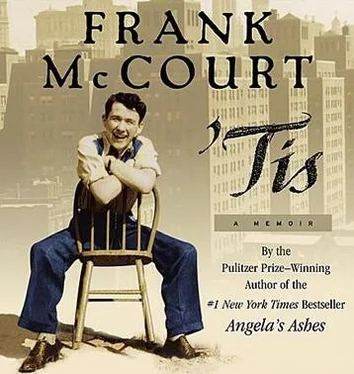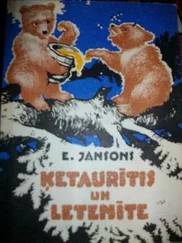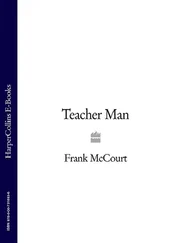Frank McCourt - 'Tis
Здесь есть возможность читать онлайн «Frank McCourt - 'Tis» весь текст электронной книги совершенно бесплатно (целиком полную версию без сокращений). В некоторых случаях можно слушать аудио, скачать через торрент в формате fb2 и присутствует краткое содержание. Жанр: Старинная литература, на английском языке. Описание произведения, (предисловие) а так же отзывы посетителей доступны на портале библиотеки ЛибКат.
- Название:'Tis
- Автор:
- Жанр:
- Год:неизвестен
- ISBN:нет данных
- Рейтинг книги:3 / 5. Голосов: 1
-
Избранное:Добавить в избранное
- Отзывы:
-
Ваша оценка:
- 60
- 1
- 2
- 3
- 4
- 5
'Tis: краткое содержание, описание и аннотация
Предлагаем к чтению аннотацию, описание, краткое содержание или предисловие (зависит от того, что написал сам автор книги «'Tis»). Если вы не нашли необходимую информацию о книге — напишите в комментариях, мы постараемся отыскать её.
'Tis — читать онлайн бесплатно полную книгу (весь текст) целиком
Ниже представлен текст книги, разбитый по страницам. Система сохранения места последней прочитанной страницы, позволяет с удобством читать онлайн бесплатно книгу «'Tis», без необходимости каждый раз заново искать на чём Вы остановились. Поставьте закладку, и сможете в любой момент перейти на страницу, на которой закончили чтение.
Интервал:
Закладка:
When the train comes in I shake hands with Alphie. I bend over to kiss my mother and hand her a twenty-dollar bill but she pulls her face away and sits in the train with her back to me and I walk away with the money back in my pocket.
44
For eight years I traveled on the Staten Island Ferry. I would take the RR train from Brooklyn to Whitehall Street in Manhattan, walk to the terminal, slip a nickel into a turnstile slot, buy coffee and a doughnut, plain no sugar, and wait on a bench with a newspaper filled with yesterday’s disasters.
Mr. Jones taught music at McKee High School though when you saw him on the ferry you might have thought he was a university professor or head of a law firm. You might have thought that even though he was a Negro who would become a black and, in later years, an African-American. Every day he wore a different three-piece suit and a hat to match. He wore shirts with collars or held in place with gold stick pins. His watch and rings were gold, too, and delicate. The old Italian shoeshine men loved him for the daily trade and generous tips and they left his shoes dazzling. Every morning he read the Times and held it with fingers protruding from little leather gloves that covered the area below the wrist to beyond the knuckles. He smiled when he told me of concerts and operas he’d attended the night before or of summer trips to Europe especially to Milan and Salzburg. He put his hand on my arm and told me I must not die before I sit in La Scala. Another teacher joked one morning that the kids at McKee must be impressed with his clothes, all that elegance, you know, and Mr. Jones said, I dress for what I am. The teacher shook his head and Mr. Jones went back to his Times. On the ferry back that day the other teacher told me Mr. Jones didn’t see himself as a Negro at all, that he’d call to the black kids to stop bopping down the hall. The black kids didn’t know what to make of Mr. Jones with all that elegance. They knew that whatever music they liked Mr. Jones would be up there talking about Mozart, playing his music on the phonograph or illustrating passages on the piano, and when it was time for the Christmas assembly he’d have his boys and girls up on the stage caroling like angels.
Every morning on the ferry I passed the Statue of Liberty and Ellis Island and thought of my mother and father coming to this country. When they sailed in were they excited as I was that first sunny October morning? Teachers going to McKee and other schools on Staten Island sat on the ferry and looked toward the statue and the island. They must have thought of their parents and grandparents coming into this place and they might have thought of all the hundreds who were sent back. It must have saddened them the way it saddened me to see Ellis Island neglected and crumbling and that ferry docked by the side low in the water, the ferry that took the immigrants from Ellis Island to the island of Manhattan and if they looked hard enough they saw ghosts hungry for the landing.
Mam had moved with Alphie to an apartment on the West Side. Then Alphie left to be his own man in the Bronx and Mam moved to Flatbush Avenue near Grand Army Plaza in Brooklyn. Her building was shabby but she felt comfortable having a place of her own where she’d be under obligation to nobody. She could walk to any number of bingo games and she was content, thank you.
In my early years at McKee High School I enrolled at Brooklyn College for classes leading to a master’s degree in English. I started with summer courses and continued with afternoon and evening classes into the aca-demic year. I would take the ferry from Staten Island to Manhattan and walk to a subway train at Bowling Green that took me to the end of the Flatbush line near Brooklyn College. On ferry and train I could read for my classes or correct the work of my students at McKee.
I told my students I wanted neat, clean, legible work but they handed in whatever they had scribbled quickly on buses and trains, in shop classes when the teacher wasn’t looking, or in the cafeteria. The papers were dotted with the stains of coffee, Coke, ice cream, ketchup, sneezes, and a lusciousness where girls had blotted their lips. A set of such papers would so irritate me I’d fling them over the side of the ferry and watch with satisfaction while they sank below the water to create a Sargasso of illiteracy.
When they asked for their papers I told them they were so bad that if I had returned them each paper would have been given a zero and would they prefer that to nothing at all?
They weren’t sure and when I thought of it I wasn’t sure myself. Zero or nothing at all? We discussed it for a whole period and decided that nothing at all was better than zero on your report card because you can’t divide nothing at all by anything and you can divide zero if you use algebra or something like that because a zero is something and nothing at all is nothing at all and nobody could argue with that. Also, if your parents see a zero on your report card they’re upset, the ones who care, but if they see nothing they don’t know what to think and it’s better to have a father and mother who don’t know what to think than a father and mother looking at a zero and giving you a punch upside your head.
After my classes at Brooklyn College I would sometimes leave the train at Bergen Street to visit my mother. If she knew I was coming she’d make soda bread so warm and delicious it melted in the mouth as fast as the butter she slathered on it. She made tea in a teapot and couldn’t help sniffing at the idea of tea bags. I told her tea bags were just a convenience for people with busy lives and she said no one is so busy they can’t take time to make a decent cup of tea and if you are that busy you don’t deserve a decent cup of tea for what is it all about anyway? Are we put into this world to be busy or to chat over a nice cup of tea?
My brother Michael married Donna from California in Malachy’s apartment on West Ninety-third Street. Mam bought a new dress for the occasion but you could see she didn’t approve of the proceedings. There was her lovely son Michael getting married and no sign of a priest, nothing but a Protestant minister in the living room who could pass for a grocer or an off-duty policeman in his collar and tie. Malachy had rented two dozen folded chairs and when we took our places I noticed Mam’s absence. She was in the kitchen smoking a cigarette. I told her the wedding was about to begin and she told me she had to finish her cigarette. Mam, for Christ’s sake, your son is getting married. She said that was his problem, she had to finish her fag and when I told her she was keeping everyone waiting her face tightened, the nose went up in the air, she stubbed out her butt in the ashtray and took her time going to the living room. On the way in she whispered she had to go to the bathroom and I hissed at her that she’d bloody well have to wait. She sat in her chair and stared over the head of the Protestant minister. No matter what was said, no matter what softness or sweetness surged here, she wouldn’t be part of it, wouldn’t yield, and when bride and groom were kissed and hugged Mam sat with her purse in her lap staring straight ahead so that the world would know she was seeing nothing, especially the sight of her lovely son Michael falling into the clutches of Protestants and their ministers.
When I visited Mam on Flatbush Avenue and we had the tea she said wasn’t it a peculiar thing she was back in this part of the world after all these years, a place where she had five children, though three would die, the little girl here in Brooklyn, and twin boys in Ireland. It might have been too much for her to think about that little girl, dead at twenty-one days, a short distance from here. She knew that if you walked down Flatbush Avenue to where it crossed Atlantic Avenue you’d still see the bars my father went wild in, spending his wages, forgetting his children. No, she wouldn’t talk about that, either. When I asked her about her days in Brooklyn she doled out scraps and then went silent. What was the use? The past is the past and it’s dangerous to go back.
Читать дальшеИнтервал:
Закладка:
Похожие книги на «'Tis»
Представляем Вашему вниманию похожие книги на «'Tis» списком для выбора. Мы отобрали схожую по названию и смыслу литературу в надежде предоставить читателям больше вариантов отыскать новые, интересные, ещё непрочитанные произведения.
Обсуждение, отзывы о книге «'Tis» и просто собственные мнения читателей. Оставьте ваши комментарии, напишите, что Вы думаете о произведении, его смысле или главных героях. Укажите что конкретно понравилось, а что нет, и почему Вы так считаете.












